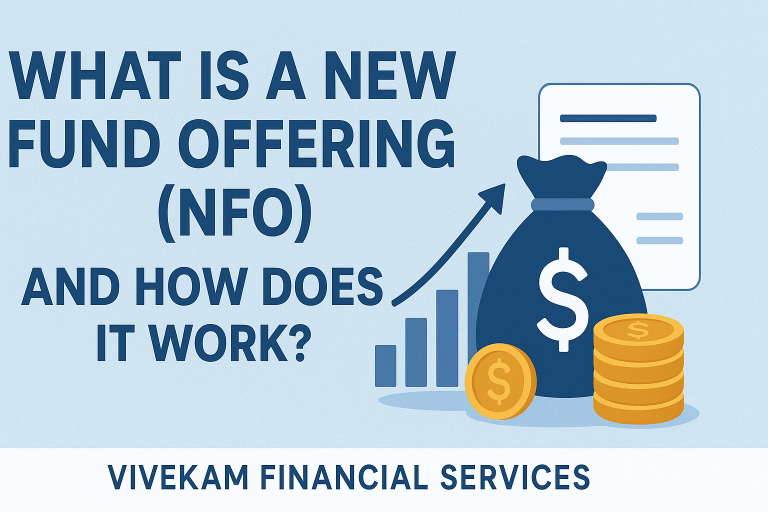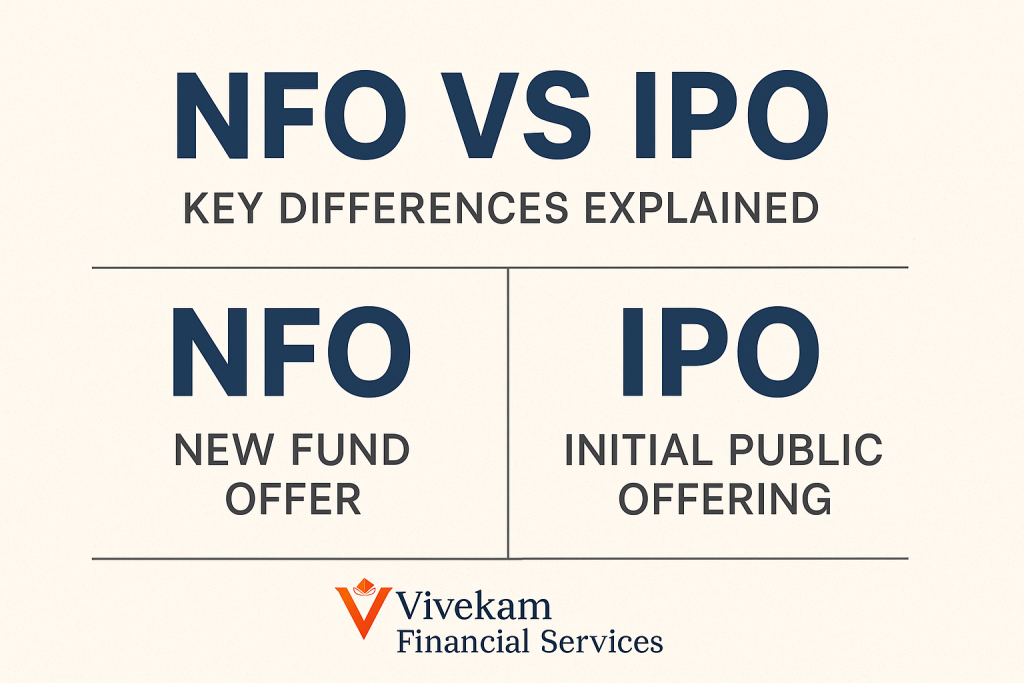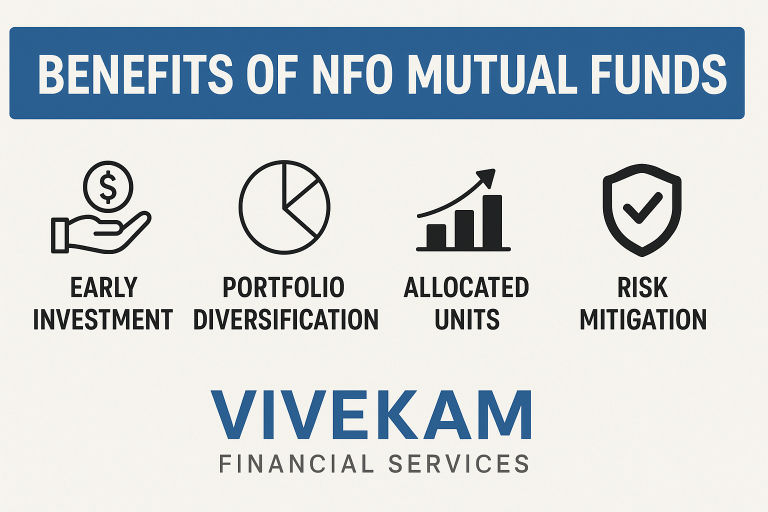What Is a New Fund Offering (NFO) and How Does It Work?

Investors often chase the “next big thing” — a hot stock, a booming sector, or in this case, a New Fund Offering (NFO). But before you rush into the latest NFO mutual funds, pause and ask: What is NFO really, and is it worth your money?
An NFO in mutual funds is like the “grand opening sale” of a new investment scheme. The fund house (AMC) launches it, sets the entry price at ₹10, and markets it as your chance to get in early. Sounds tempting, right? But like any sale, not everything new is worth buying.
Let’s break down how NFOs work, their types, benefits, risks, and whether you should invest in upcoming NFOs in 2025 or stick to tried-and-tested funds.
Introduction to NFO Mutual Funds
What is NFO in Mutual Funds?
At its core, an NFO is when a fund house rolls out a brand-new mutual fund scheme. Investors buy units at a flat ₹10 per unit. Once the fund gathers enough money, it invests in stocks, bonds, or a specific theme.
Think of it as a chef introducing a new dish. You’re the first to try it, but unlike a restaurant, there’s no customer review yet to tell you if it’s delicious or a disaster.
The Concept of New Fund Offerings Explained
Why do AMCs launch NFOs? Often to tap into new themes (like AI, EVs, or green energy) or replicate global indices. For investors, this means early access to new opportunities. But it also means walking into unknown territory.
Types of NFOs in Mutual Funds
Open-Ended NFOs
- Stay open even after the NFO window closes.
- Investors can buy/sell anytime at NAV.
- Best for flexibility seekers.
Closed-Ended NFOs
- One-time subscription window, then locked in.
- Units can only be traded on exchanges.
- Feels like buying a train ticket — once the train leaves, you can’t board.
Interval Funds
- A hybrid: open for transactions only during fixed intervals.
- Great if you want semi-flexibility but don’t mind waiting.
NFO vs IPO: Key Differences Explained

Similarities Between NFO and IPO
- Both raise capital for something new.
- Both have a limited subscription window.
- Both trigger investor FOMO.
Difference Between NFO and Mutual Fund Schemes
- IPO = ownership in a company.
- NFO = ownership of fund units, managed by professionals.
- IPOs may double on listing day; NFOs rarely skyrocket overnight.
How Does an NFO Work?
The Process of Launching an NFO
- AMC designs a theme (AI, healthcare, energy, etc.).
- Gets SEBI approval.
- Opens the NFO window for investors.
- Collects money and allots units at ₹10.
- Invests funds into the chosen theme.
Role of Asset Management Companies (AMCs)
The AMC is the chef, fund managers are sous-chefs, and your money is the raw ingredient. A good chef = good dish; a bad one = wasted dinner.
Regulatory Oversight by SEBI
SEBI acts like the food inspector, ensuring recipes (funds) meet safety standards before serving to investors.
How to Invest in New Fund Offerings
Step-by-Step Process of NFO Investment
- Scout upcoming NFOs on AMC websites or news.
- Read the Scheme Info Document (SID) — your recipe card.
- Choose lump-sum or SIP (if offered).
- Apply online or via distributor before the NFO closes.
- Get units at ₹10 — the real ride starts after that.
Online vs Offline NFO Applications
Online = Fast & digital.
Offline = Forms, signatures, old-school style.
Benefits of NFO Mutual Funds

Low Entry Price Advantage
₹10 per unit looks cheap, but remember: price doesn’t equal value. Still, it feels easier for new investors.
Diversification Opportunities
Many NFOs bring themes missing in India’s market — global tech, EVs, green energy. A great way to spice up your portfolio.
Potential for High Returns
If you get in early on a theme that booms, the payoff can be big. Example: Tech-focused NFOs launched years ago gave strong returns.
Risks Associated with NFO Investments
Lack of Track Record
No past performance = no way to check if the fund manager can deliver.
Market Volatility Impact
NFOs tied to trendy sectors can swing wildly. EVs could rise, but if oil prices crash, auto stocks take a hit.
Liquidity Constraints
Closed-ended NFOs = money locked in. Missed opportunities elsewhere.
Latest NFO Mutual Funds in 2025
Upcoming NFOs to Watch Out For
- Global AI & Tech NFOs
- Renewable Energy Funds
- Healthcare & Pharma NFOs
- Emerging Market ETFs
Best NFO Mutual Funds 2025
Instead of blindly chasing names, here’s what to check:
- AMC’s track record
- Fund manager’s expertise
- Theme’s long-term potential
- Exit options
NFO vs Existing Mutual Funds: Which Should You Choose?
Factors to Consider Before Investing
- Your investment horizon.
- Your risk appetite.
- Whether the new theme adds real value.
Who Should Invest in NFOs?
- Risk-tolerant investors.
- Those already diversified.
- Investors with FOMO who still want calculated bets.
Expert Tips for NFO Investment
Evaluating AMC Reputation
Pick fund houses with a history of delivering. Avoid one-hit wonders.
Understanding Fund Objectives
Don’t fall for buzzwords. Read the fund’s actual objective.
Long-Term vs Short-Term Goals
NFOs are not for quick flips. Enter only if you can stay invested.
Frequently Asked Questions (FAQs)
- Should I invest in every new NFO?
No. Most NFOs underperform established funds. Pick selectively. - Why are NFOs priced at ₹10?
Just to attract investors. NAV price doesn’t define returns. - Are NFOs better than SIPs in existing funds?
Usually not. SIPs in proven funds often beat new NFOs in the long run. - Do NFOs guarantee profits?
Never. Returns depend on market conditions and fund manager skill. - Can I exit an NFO easily?
Only in open-ended ones. Closed-ended = money locked. - What’s smarter: NFO or mutual fund with a 5-year record?
In most cases, the seasoned mutual fund wins.
Conclusion: Is NFO Investment Right for You?
NFOs are shiny and exciting, but new doesn’t always mean better. If you’re a seasoned investor with risk appetite, an NFO can add spice to your portfolio. If you’re a beginner, stick to existing funds with proven records.








